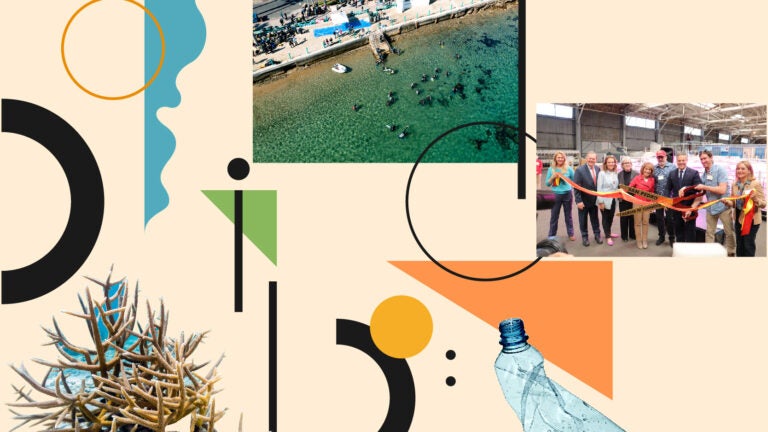
Combatting climate change, pollution, waste: USC Dornsife scholars took big steps toward sustainability in 2022
Finding ways to address climate change and its effects, curb the spread of pollution and reduce waste rise to the top of priorities for scholars at the USC Dornsife College of Letters, Arts and Sciences. Faculty from disciplines across the College this year produced innovative research and initiatives that improve the planet and pave the way for a more sustainable future.
New lab debuts, dedicated to more resilient aquaculture
In March, USC partnered with AltaSea to open the USC Dornsife Nuzhdin Aquaculture Lab at AltaSea’s property in San Pedro, near Long Beach, California. The lab contains some 24 tanks dedicated to the cultivation of stronger and healthier kelp, oysters and mussels that can withstand the effects of climate change.
“This has the potential to reduce global warming, produce biofuels from the ocean, restore kelp populations and provide and propose a natural solution for the security of California shoreline,” said Sergey Nuzhdin, professor of biological sciences, who heads the lab.
Volunteers clear tons of trash from popular island harbor
Also in March, more than 700 volunteers converged on Catalina Island off the coast of Los Angeles to spend their day clearing nearly two tons of debris clogging the waters of Avalon Harbor. Divers also freed nearly 130 creatures entangled in debris, including crabs, sea urchins, brittle stars and octopuses.
This year marked the 40th harbor cleanup event and was co-hosted by the USC Dornsife Wrigley Institute for Environmental Studies, the USC Catalina Hyperbaric Chamber and the Catalina Conservation Divers.
Faculty work to clarify confusing environmental information
Matthew Kahn, Provost Professor of Economics and Spatial Sciences, and Rob Metcalfe, associate professor of economics, are using cutting-edge digital tools to accurately convey potential long-term environmental risks for homebuyers. And a group of USC Dornsife experts on science communication are investigating how political affiliation may distort understanding of climate terms.
Both of these projects were recipients of the 2022 Faculty Innovation Awards, presented by the USC Wrigley Institute for Environmental Studies in September.
Researchers spin medicine from trash
USC researchers developed a way to transform discarded plastics into chemicals that help produce medicine. Travis Williams, professor of chemistry, and Clay C.C. Wang, professor of pharmaceutical sciences, broke down plastic trash collected from the waters around Catalina Island into chemical groups, which they then fed to a lab-raised fungus. This fungus then produced several drugs, including antibiotics, according to a study the duo published in November.
With the world on track to produce 1.1 billion tons of garbage each year by 2040, finding a way to turn this waste into something useful would be a major breakthrough. Plus, it could be cheap. “If you look at the biological cycle, that efficiency is very exciting because the process will be cost-sensitive. We’re going to make the products in bulk quantities,” said Wang.
Researchers uncover key to saving coral reefs
The health of many coral reefs around the world is declining due to warming oceans, pollution and other stressors. To help boost their ecosystems, scientists have turned to transplanting healthy corals into areas experiencing die-offs. However, these transplants (dubbed “outplants”) doesn’t always work. Researchers have been baffled as to why some new coral survive and others fail — until now.
Carly Kenkel, Gabilan Assistant Professor of Biological Sciences, and Wyatt Million, a former PhD student in Kenkel’s lab, authored a study published in November revealing that genetic diversity among the coral outplants is crucial for success.
“On these reefs, diversifying coral outplants is safer than betting on one ’super coral’ to succeed. There will be winners and losers in every environment. And reefs are really dynamic; each environment can be really different from a coral’s perspective, and they’re going to be even more different as the climate continues to change.”